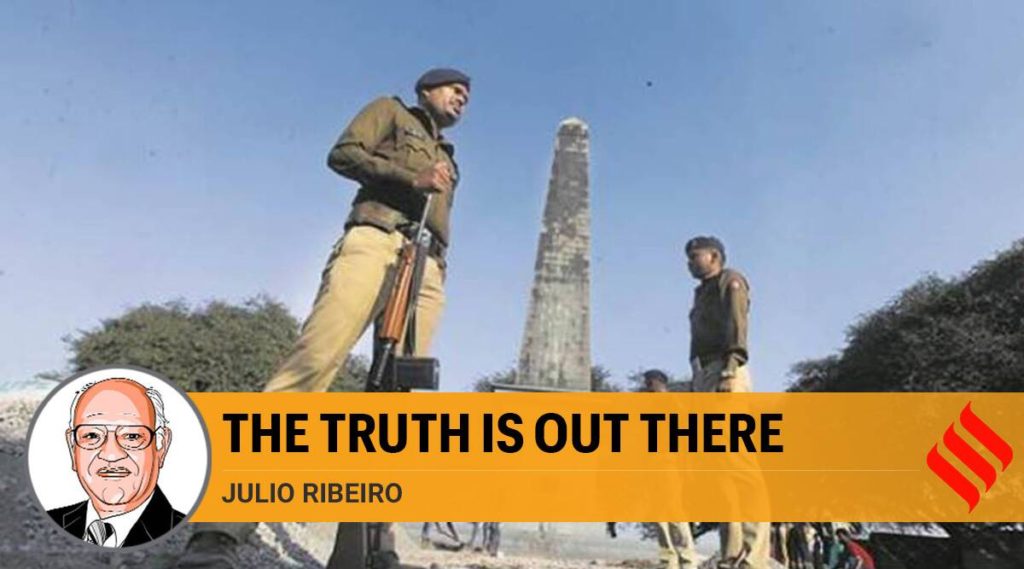Boston is an American city that is known to numerous Indians. A degree from MIT is much sought after. A few years ago, my wife and I spent a few days there as my nephew, my sister’s son, was residing in that city. Police martyr Hemant Karkare’s daughter resides there now.
Soon, Boston will be known to policemen in India for something quite different. Routine investigations of crimes will be looked at askance by the public and, god forbid, by the courts, because of the findings recorded by a private digital forensics company called Arsenal Consulting, and its head honcho, Mark Spencer. I heard Spencer with rapt attention on a national English language TV channel last week certifying that the police in India had been taken for a ride by an extremely clever hacker.
At first, it was the Pune Rural Police that registered and started the investigation into what is now known as the Bhima Koregaon rioting case. Bhima Koregaon is a village in Pune district, Maharashtra. Two hundred years ago, the Maratha army of the Peshwas had been worsted in battle by a contingent of the East India Company in which there was a 14 per cent component of Dalit soldiers. Ever since B R Ambedkar mentioned their valour at the second Round Table Conference with the colonial rulers, Dalits have expressed pride at this humbling of the upper castes by an opponent which sported Dalits in its ranks. On the 200th anniversary of the battle, when bigger-than-usual celebrations were planned, upper castes and Dalits clashed, resulting in an unfortunate casualty. The Pune Rural police, in whose jurisdiction the event occurred, fixed the blame on two Hindutva activists, Sambhaji Bhide and Milind Ekbote, of whom only the latter was arrested.
Soon after, a complaint was made to the Pune City Police that a Maoist group, eager to exploit the age-old rivalry between Dalits and Marathas, had instigated the riots at Bhima Koregaon. The City Police’s inquiries revealed that a far-left conspiracy was in place to topple the elected government at the Centre with the help of the CPI (Maoist) and, what was more serious, a plot to kill our prime minister. Fifteen left-leaning activists from Mumbai, Delhi, Hyderabad were arrested in three or four stages and charged under the stringent provisions of the UAPA that consigns the accused to jail without bail, for prolonged periods. Since trials in such cases take ages to even begin, the process of law itself becomes the punishment for crimes that have not been proved in court.
The evidence against the activists was based on the retrieval from their computers of incriminating correspondence that linked them with the banned Maoists’ outfit. There were 10 letters found on the computer of the Delhi-based activist, Rona Wilson. Those disputed letters were addressed to the Hyderabad poet-activist Varavara Rao and others now under arrest.
It is obvious that Wilson was surprised by the presence of such letters on his computer. Suspecting that the long arm of the government would not ensure a true and fair finding in the country of his birth, Wilson’s lawyer used the good offices of a human rights body in the US to refer the pen drive given to him by the prosecution as evidence to be used in court (mandatory as per criminal procedure laws) to a highly-respected private company, Arsenal Consulting, which undertook the examination pro-bono. The Washington Post was given a copy of the company’s findings. It checked with three other leading digital forensics experts. Each separately examined the pen drive and confirmed the findings.
I heard Spencer on TV. He came across as a seasoned professional and stated that he had never encountered such bold and clever manipulation. The 10 impugned letters, he said, had been inserted through malware into Wilson’s computer over a period of two years between the time the laptop was first compromised and the moment the attacker delivered the last incriminating document in a hidden folder.
I do not understand technology myself. In my days in the Indian Police Service, this technology was not in use. But I am fully satisfied from all the evidence disclosed by the Post that a very knowledgeable individual or individuals have helped to concoct evidence against Wilson and others.
The mention of a plan to kill the PM was the initial cause of my own suspicions. To involve as many as 15 disparate individuals from different parts of the country in such a diabolical plan appeared incredulous. The degree of danger to the plan unravelling if so many persons were involved was way beyond the limits of safety and the secrecy required for the plan to succeed. Another cause for my suspicion was the arrest six months ago of a Jesuit priest, Stan Swamy, by the NIA. To accuse a Jesuit of siding with Maoists and their violent proclivities stretched the limits of my credulity. The Jesuits take a vow of obedience to their superiors before ordination as priests. And church doctrine is diametrically opposed to Maoist ideology as far as the use of violence to achieve objectives is concerned. Swamy would be risking expulsion from the Jesuit order if he disobeyed church diktats. And he certainly did not fit the bill of a rebel.
This is a fit case where the courts should intervene to ensure justice. If the charge of planting evidence is proved, then it is incumbent on the NIA to investigate and ascertain the identity of the culprit. If this is not done, the police across the country will be suspected of concocting evidence even when there is no cause to doubt the integrity of their investigations.
(The writer, a retired IPS officer, was Mumbai police commissioner, DGP Gujarat and DGP Punjab, and is a former Indian ambassador to Romania. Courtesy: Indian Express.)




